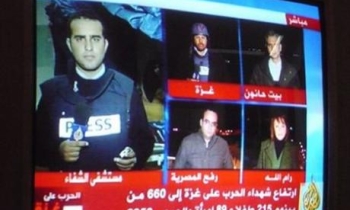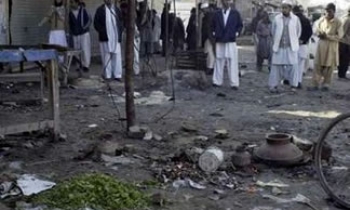Wars often start when extremists, and extreme points of view, prevail. That's worth bearing in mind as violent clashes continue over cartoons of the prophet Mohammed. They were published more than four months ago in a Danish newspaper, but like a slow-burning fuse, radical Muslims have exploited them to ignite anti-Western violence across the Muslim world from Iran and Afghanistan to India and Somalia.
The cartoons are their latest vehicle for creating a clash of civilizations, building on such past episodes as the fatwa, or death sentence, on writer Salman Rushdie in the late 1980s after his Satanic Verses was deemed blasphemous by Iran's Ayatollah Khomeini. Or the riots sparked across the Muslim world last year when Newsweek magazine reported, erroneously, that U.S. guards at Guantanamo Bay, Cuba, had desecrated copies of the Quran.
This is to be expected. What's more disturbing is those around the world who are using the situation to advance their own agendas and prejudices. Among them:
The Danish newspaper that published the 12 cartoons in the first place. Its initial decision might be defensible, if distasteful: Editors say they wanted to start a debate, despite warnings that printing satirical depictions of Mohammed would be offensive to Muslims. The same can't be said about later cynical moves: One editor said he intended to work with an Iranian publication to publish cartoons lampooning the Holocaust. This was a perverse notion of balance. Having gratuitously offended one group, he thinks the solution is to do the same to another, all the while ignoring the fact that the cartoons have produced not the intended debate, but violence and hatred instead. Fortunately, he was overruled.
As the German daily newspaper Die Welt put it, there is "no right to be shielded from satire in the West." The price of free speech is that it sometimes will be offensive. Even so, those who use it to gratuitously inflame deserve the criticism they receive.
Middle Eastern governments that see the clashes as a way to hold back pressure for democratic change. The Egyptian Embassy in Denmark, for example, reportedly helped Danish imams publicize the cartoons – including cartoons, never printed, showing Mohammed with the face of a pig. The Syrian government likely condoned the razing of Nordic embassies in Damascus and, no doubt, of the Danish consulate in Beirut. Iran's president, Mahmoud Ahmadinejad, has jumped on the affair as a way to stoke more anti-Semitic hysteria.
If there's value to be salvaged from this episode, it is the reaction of some moderate Muslims.
On Wednesday, senior Afghan cleric Mohammed Usman and other spokesmen for Islamic organizations put the debate where it ought to be. "Islam says it's all right to demonstrate, but not to resort to violence. This must stop," Usman said after police shot four protesters to death to stop hundreds from marching on a U.S. military base. "We condemn the cartoons, but this does not justify violence. These rioters are defaming the name of Islam."
In Washington, after discussing the matter with President Bush, Jordanian King Abdullah said the cartoons are unacceptable but so is the violence. "Those that want to protest should do it thoughtfully, articulately, express their views peacefully," he said.
It's particularly important for moderate Muslims to speak up – and to balance their anger over the cartoons with outrage over the beheadings and other atrocities being carried out in the name of Islam by fanatics seeking to hijack their religion. That is the only way the war on terrorism – and for the future of Islam – will be won.
The 21st century is an age of mobility, integration and instant communications that are obliterating many of the traditional lines of cultural separation, but at different, often jarring speeds. In Europe, immigration and integration issues are roiling the public square, through disputes over everything from wearing headscarves in schools to radicalism in some mosques. Many European Muslims complain of "Islamophobia."
Unfamiliar with Western practices, they see no reason those who insult Islam can't be jailed, as a newspaper editor in Jordan was after he reprinted the cartoons.
The point is that in such an environment, small actions can have dangerous consequences. Extremists would like the cartoons to become the equivalent of an assassin's single bullet that ignited World War I. In the tinderbox world of today, non-extremists have an obligation to douse the fire, not fan the flames.









